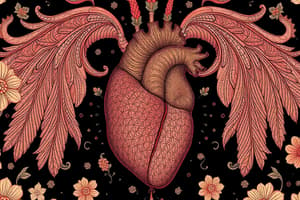Podcast
Questions and Answers
What is the main action of adrenaline on the heart?
What is the main action of adrenaline on the heart?
- It activates cardiac β-receptors. (correct)
- It stabilizes the heart rhythm.
- It blocks the effects of vagus nerve.
- It decreases heart rate.
What is the significance of administering propranolol slowly?
What is the significance of administering propranolol slowly?
- To amplify its cardiac stimulation.
- To avoid arrhythmias.
- To prevent a rapid decrease in heart rate. (correct)
- To enhance its absorption.
Which statement correctly describes the administration order of drugs in this experiment?
Which statement correctly describes the administration order of drugs in this experiment?
- Adrenaline is administered after atropine.
- Atropine is administered after the second dose of propranolol.
- Propranolol is administered before adrenaline.
- The first dose of adrenaline is followed by propranolol. (correct)
What effect does atropine have on heart rhythm?
What effect does atropine have on heart rhythm?
What is the observed result on heart rate after administration of propranolol?
What is the observed result on heart rate after administration of propranolol?
In the context of this experiment, what was noted after the third administration of adrenaline?
In the context of this experiment, what was noted after the third administration of adrenaline?
Which drug was administered to relieve the inhibitory effect of the vagus nerve?
Which drug was administered to relieve the inhibitory effect of the vagus nerve?
What can rapid administration of adrenaline lead to?
What can rapid administration of adrenaline lead to?
Flashcards
What is adrenaline?
What is adrenaline?
A hormone and neurotransmitter that stimulates the sympathetic nervous system, increasing heart rate and blood pressure.
What is propranolol?
What is propranolol?
A drug that blocks the effects of adrenaline by binding to and blocking beta-adrenergic receptors.
What is atropine?
What is atropine?
A drug that blocks the effects of acetylcholine at muscarinic receptors, increasing heart rate.
What is sinus arrhythmia?
What is sinus arrhythmia?
Signup and view all the flashcards
What is sinus tachycardia?
What is sinus tachycardia?
Signup and view all the flashcards
What is sinus bradycardia?
What is sinus bradycardia?
Signup and view all the flashcards
What is an arrhythmia?
What is an arrhythmia?
Signup and view all the flashcards
What is pharmacology?
What is pharmacology?
Signup and view all the flashcards
Study Notes
Effect of Propranolol on Adrenaline-Induced Arrhythmia
- Adrenaline (epinephrine): A α and β agonist, activating β receptors in the heart causes cardiac excitation. High doses or rapid administration can induce cardiac arrhythmia.
- Propranolol: A β-receptor antagonist that counteracts the effects of adrenaline on the heart, reducing cardiac excitation.
- Atropine: An M receptor antagonist that reduces the heart's response to vagus nerve inhibition. This promotes cardiac excitation, counteracting the inhibitory effect of the vagus nerve.
- ECG: Electrocardiogram measures the electrical activity of the heart.
- Normal ECG: Displays distinct waveforms (P, QRS, T) indicating normal electrical conduction and heart function.
- Sinus arrhythmia: Abnormal heart rate characterized by variations in heart rate, a common effect of adrenaline or other factors. Can present as tachycardia (shortened R-R intervals) or bradycardia (prolonged R-R intervals).
- Drug Administration Protocol: Includes steps for administering adrenaline, propranolol, and atropine, and recording ECG readings at specific time intervals post-administration. Adrenaline is administered rapidly while propranolol is given slowly.
- Cautions: Rapid administration of adrenaline and slow administration of propranolol are critical for preventing unwanted side effects.
- Results Table: Shows effects of first, second, and third doses of adrenaline, propranolol, and atropine on heart rate and rhythm abnormalities. First adrenaline dose tends to give obvious arrhythmia, second dose leads to normal readings. The subsequent propranolol and atropine administrations also show different affects, leading to further normal readings.
Studying That Suits You
Use AI to generate personalized quizzes and flashcards to suit your learning preferences.




